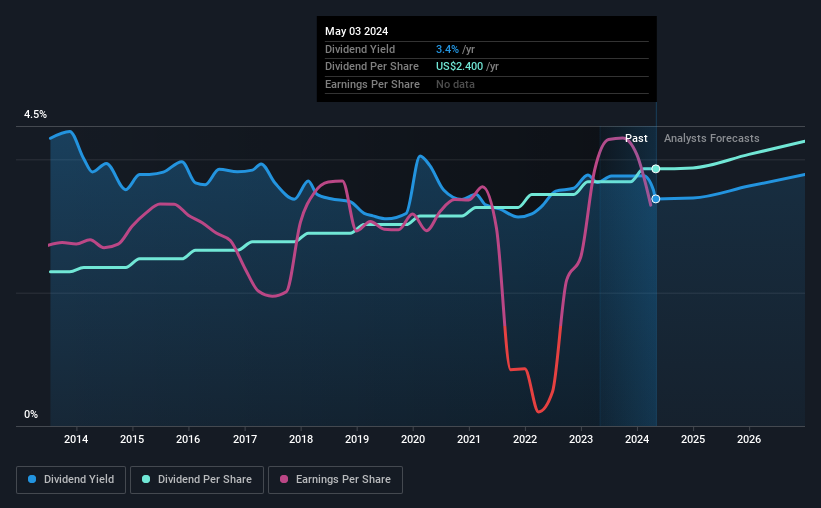Public Service Enterprise Group (NYSE:PEG) Is Due To Pay A Dividend Of $0.60
The board of Public Service Enterprise Group Incorporated (NYSE:PEG) has announced that it will pay a dividend on the 28th of June, with investors receiving $0.60 per share. This takes the annual payment to 3.4% of the current stock price, which is about average for the industry.
View our latest analysis for Public Service Enterprise Group
Public Service Enterprise Group's Dividend Is Well Covered By Earnings
Unless the payments are sustainable, the dividend yield doesn't mean too much. Prior to this announcement, Public Service Enterprise Group's earnings easily covered the dividend, but free cash flows were negative. No cash flows could definitely make returning cash to shareholders difficult, or at least mean the balance sheet will come under pressure.
Over the next year, EPS is forecast to expand by 17.1%. Assuming the dividend continues along recent trends, we think the payout ratio could be 58% by next year, which is in a pretty sustainable range.
Public Service Enterprise Group Has A Solid Track Record
Even over a long history of paying dividends, the company's distributions have been remarkably stable. The annual payment during the last 10 years was $1.44 in 2014, and the most recent fiscal year payment was $2.40. This works out to be a compound annual growth rate (CAGR) of approximately 5.2% a year over that time. Dividends have grown at a reasonable rate over this period, and without any major cuts in the payment over time, we think this is an attractive combination as it provides a nice boost to shareholder returns.
Dividend Growth May Be Hard To Achieve
Some investors will be chomping at the bit to buy some of the company's stock based on its dividend history. However, Public Service Enterprise Group has only grown its earnings per share at 3.0% per annum over the past five years. Public Service Enterprise Group is struggling to find viable investments, so it is returning more to shareholders. This isn't necessarily bad, but we wouldn't expect rapid dividend growth in the future.
Our Thoughts On Public Service Enterprise Group's Dividend
Overall, this is probably not a great income stock, even though the dividend is being raised at the moment. With cash flows lacking, it is difficult to see how the company can sustain a dividend payment. Overall, we don't think this company has the makings of a good income stock.
Companies possessing a stable dividend policy will likely enjoy greater investor interest than those suffering from a more inconsistent approach. At the same time, there are other factors our readers should be conscious of before pouring capital into a stock. To that end, Public Service Enterprise Group has 3 warning signs (and 1 which can't be ignored) we think you should know about. Looking for more high-yielding dividend ideas? Try our collection of strong dividend payers.
Have feedback on this article? Concerned about the content? Get in touch with us directly. Alternatively, email editorial-team (at) simplywallst.com.
This article by Simply Wall St is general in nature. We provide commentary based on historical data and analyst forecasts only using an unbiased methodology and our articles are not intended to be financial advice. It does not constitute a recommendation to buy or sell any stock, and does not take account of your objectives, or your financial situation. We aim to bring you long-term focused analysis driven by fundamental data. Note that our analysis may not factor in the latest price-sensitive company announcements or qualitative material. Simply Wall St has no position in any stocks mentioned.

 Yahoo Finance
Yahoo Finance 
